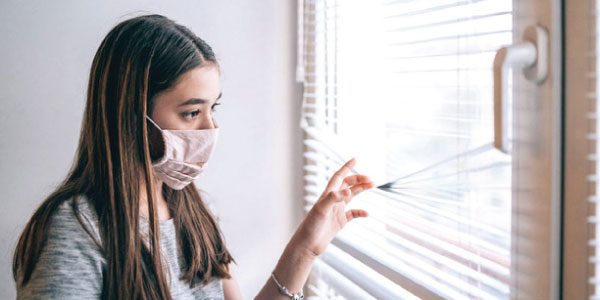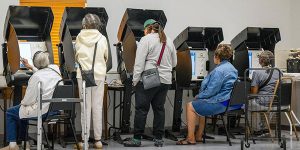
By Angie Baldelomar
The pandemic has changed people’s lives.
For students, it has forced them to make the transition from in-person to remote learning. Although online learning has brought several challenges, including technological ones, one of the biggest might be the development of students’ social and emotional skills.
The Shawnee Mission School District (SMSD) in Johnson County, Kansas, where about a third of all students continue to learn remotely, is finding ways to address that challenge.
Brandi Roth, SMSD school social worker, said teachers have created activities for students beyond just classroom interaction and have spent time trying to keep building connections with and among students. For example, the district has started doing morning meetings as a mandatory way to start the school day, she said.
“The whole 20 minutes that begins your day is about connecting and learning about one another and supporting the social-emotional needs of the students, and that’s just such a great steppingstone to starting your day like that,” Roth said.
That sets up students for a positive learning environment, Roth said.
Dr. John McKinney, SMSD director of family services, said making this meeting mandatory is proof that the district’s focus is on students’ well-being.
“When you make it a mandatory part of every class across the district, it just sends that positive message that social-emotional needs and (the) well-being of our students and our staff is important,” McKinney said.
Brenna Sandefur-Farrar, an SMSD social worker, said students that have been doing remote learning all year have developed a new set of social skills.
“The screen is a really different social way to interact than being in person, so there’s a lot of new social cues,” Sandefur-Farrar said.
Looking at the 2021-22 school year, McKinney said the focus when the year begins will be around building relationships.
“We’ve made it a point to say, in the 21-22 school year, it shouldn’t look like it did in other years,” he said. “It should look (we are) like spending some time on the social and emotional needs of our students and our staff, (so) we’re going to spend a lot more time assessing where their social and emotional needs are and trying to address those before we jump into academic needs.”
It is about meeting students where they are, McKinney said, and helping students transition back into a classroom environment.
Both Roth and Sandefur-Farrar emphasize that parents also should remember to take care of themselves, because everyone is learning this new way of living. It is important for parents to be prepared for this process to continue, too.
“As educators and as parents, we do need to be prepared for the process that will continue to happen, even as we get into new norms,” Sandefur-Farrar said. “Remember that this is something that we’re going to still be going through for a while.”
SMSD desarrolla las habilidades sociales y emocionales de los estudiantes durante una pandemia
La pandemia ha cambiado la vida de las personas.
Para los estudiantes, los ha obligado a hacer la transición del aprendizaje presencial al aprendizaje remoto. Aunque el aprendizaje en línea ha traído varios desafíos, incluidos los tecnológicos, uno de los más grandes puede ser el desarrollo de las habilidades sociales y emocionales de los estudiantes.
El Distrito Escolar de Shawnee Mission (SMSD, por sus siglas en inglés) en el condado de Johnson, Kansas, donde aproximadamente un tercio de todos los estudiantes continúan aprendiendo de forma remota, está encontrando formas de abordar ese desafío.
Brandi Roth, trabajadora social escolar de SMSD, dijo que los maestros han creado actividades para los estudiantes más allá de la interacción en el aula y han dedicado tiempo a tratar de seguir construyendo conexiones con y entre los estudiantes. Por ejemplo, el distrito ha comenzado a realizar reuniones matutinas como una forma obligatoria de comenzar el día escolar, dijo.
“Los 20 minutos completos que comienzan su día se tratan de conectarse y aprender unos de otros y apoyar las necesidades socioemocionales de los estudiantes, y ese es un gran trampolín para comenzar el día así”, dijo Roth.
Eso prepara a los estudiantes para un ambiente de aprendizaje positivo, dijo.
El Dr. John McKinney, director de servicios familiares de SMSD, dijo que hacer esta reunión obligatoria es una prueba de que el enfoque del distrito está en el bienestar de los estudiantes.
“Cuando lo convierte en una parte obligatoria de todas las clases en todo el distrito, simplemente envía un mensaje positivo de que las necesidades socioemocionales y (el) bienestar de nuestros estudiantes y nuestro personal son importantes”, dijo McKinney.
Brenna Sandefur-Farrar, trabajadora social de SMSD, dijo que los estudiantes que han estado haciendo aprendizaje remoto durante todo el año han desarrollado un nuevo conjunto de habilidades sociales.
“La pantalla es una forma social de interactuar realmente diferente a la de estar en persona, por lo que hay muchas señales sociales nuevas”, dijo Sandefur-Farrar.
Mirando al año escolar 2021-22, McKinney dijo que el enfoque cuando comience el año estará en la construcción de relaciones.
“Nos hemos propuesto decir que, en el año escolar 21-22, no debería verse como en otros años”, dijo. “Debería verse como si estuviéramos dedicando algún tiempo a las necesidades sociales y emocionales de nuestros estudiantes y nuestro personal, (así que) vamos a dedicar mucho más tiempo a evaluar dónde están sus necesidades sociales y emocionales y tratarlas antes de saltar a las necesidades académicas”.
Se trata de encontrar a los estudiantes donde están, dijo McKinney, y ayudar a los estudiantes en la transición de regreso al ambiente del salón de clases.
Tanto Roth como Sandefur-Farrar enfatizan que los padres también deben recordar cuidarse a sí mismos, porque todos están aprendiendo esta nueva forma de vida. Es importante que los padres estén preparados para que este proceso también continúe.
“Como educadores y como padres, debemos estar preparados para el proceso que continuará ocurriendo, incluso cuando adoptemos nuevas normas”, dijo Sandefur-Farrar. “Recuerde que esto es algo por lo que todavía vamos a pasar por un tiempo”.









